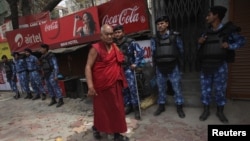A Tibetan man who disappeared under mysterious circumstances is presumed dead, with activists accusing Chinese security forces of orchestrating his murder.
The man, 57-year-old Dorjee Rabten, had been prepared to set himself on fire to protest Chinese rule.
Gyaltsen Choedak, an exiled Tibetan with close contacts in the region, says Rabten had traveled to the city of Siling when he met his end.
"On August 23, Chinese security personnel murdered Dorjee Rabten in Siling's 'Pachen' guest house," said Choedak. "When his family could not reach him, they went to the guest house to look for him. The Chinese security official called Dorjee Rabten’s elder son Drukjham Gyal and told him that he should come at once to pick up the body and that he has to sign a document – if he does not sign, he won’t get the body. He was also warned that he could not bring any other member of his family."
But Choedak says the son never got the body or an explanation of how his father died. Instead, he was given what he was told was his father’s ashes and a warning that the family would face severe consequences if they shared anything about the death with outsiders.
Choedak and other sources, all of whom asked to remain anonymous, accuse Chinese security forces of killing Dorjee Rabten to prevent him from immolating himself in protest of China's Tibet policies.
VOA made numerous phone calls to the Chinese Embassy in Washington and the Chinese Consulate General in New York, but was unable to reach any officials for comment in for publication.
Increased arrests
If true, the accusation would represent a significant escalation in China's ongoing crackdown against Tibetans pushing for more autonomy.
According to Sophie Richardson, China director for U.S.-based Human Rights Watch, Beijing's crackdown on Tibetan activists has become increasingly intrusive.
"[They're] placing more officials in monasteries, arresting monks, denying people access to the bodies of loved ones who've immolated," she said, adding that her group issued a report in July charging Beijing with blocking Tibetans in China from accessing uncensored news. "It really is sort of adding insult to injury."
Over the past several months, Chinese security forces have stepped up arrests, pursuing anyone involved with self-immolations; several monks were recently detained for taking pictures of a self-immolation, and in early October police in Nagchu arrested about 30 people after a 43-year-old man who set himself on fire in protest – including the victim's uncle, sister and brother-in-law.
Richardson says just the threat of more immolations is changing the way Chinese security forces patrol the streets.
"It's now fairly easy to photograph different parts of the security forces in downtown Lhasa, for example, walking around not just heavily armed with weapons, but carrying fire extinguishers as preparations to put out these immolations should they happen spontaneously," she said.
A question of timing
Since February of 2009, at least 57 Tibetans have set themselves on fire to protest Chinese policies in Tibet. While the Tibetan government-in-exile says 47 of those cases have resulted in deaths, there are no confirmed cases of Chinese officials stopping a potential self-immolation by killing the would-be protester.
According to Mary Beth Markey, president of the International Campaign for Tibet, while Chinese security officials have increasingly turned to intimidation and punishment as part of what she calls a misguided effort to control the flow of information, it has long appeared there was a limit to how far Beijing was willing to go.
"The Chinese response on the ground seems to be a great show of force, an attempt to exert control, but in the main it has not been a violent response," she said, adding that the upcoming change in leadership would make it a strange time for Beijing to change tactics.
"With all the tremendous concerns that this transition go smoothly," she said, "I don't think the Chinese are looking for any extreme responses inside Tibet."
China has long accused Tibetan exiles of self-immolating as part of a separatist struggle, denouncing them as terrorists, while representatives of the Dalai Lama say protesters are driven to self-immolate because they cannot tolerate China's repressive policies.
Gary Locke, U.S. State Department ambassador to China, recently visited two monasteries in Aba Prefecture of Sichuan Province, which has seen 26 of self-immolations since 2009.
The visit was part of Locke’s first trip as ambassador to a predominantly ethnic-Tibetan region of the country.





